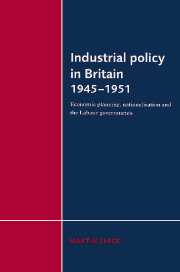 Industrial Policy in Britain 1945–1951
Industrial Policy in Britain 1945–1951 1 - Economic planning
Published online by Cambridge University Press: 14 January 2010
Summary
‘Peace-time planning, in any serious sense, began in the year 1947’.
(E. A. G. Robinson, Economic Planning in the UK, p. 3)A lot can happen during a three-week holiday in Cornwall. Returning from a holiday begun on 26 July 1945, the economist James Meade ‘came back to a totally different world: the United Kingdom had a Labour Government with a huge majority; the future of the world had been totally altered by the dropping of two atomic bombs; and the war in the Far East was over. The situation when I got back was quite transformed.’ By the time of his return, the announcement of the general election results had brought to power a Labour government committed to nationalising the coal mines and the leading utilities, determined to effect improvements in health, housing, and welfare, and concerned to pursue low rates of unemployment. In a remarkable legislative programme the basis for both the postwar welfare state and increased government involvement in the economy was to be established. Much of what the later Thatcher governments sought to reorganise and reform had its origins directly in the legislative programme of the 1945–51 Attlee governments.
The immediate task confronting the government was to supervise the transition of the economy from a wartime to a peacetime footing. This had been effected once before, after World War I, and lessons were drawn from that experience.
- Type
- Chapter
- Information
- Industrial Policy in Britain 1945–1951Economic Planning, Nationalisation and the Labour Governments, pp. 1 - 15Publisher: Cambridge University PressPrint publication year: 1997


